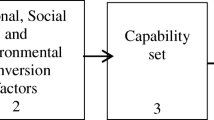Abstract
This paper explores linkages between theory and practice in psychiatric social work, specifically between Karl Barth’s theology of social justice, Martha Nussbaum’s capability theory, and an innovative component in psychiatric services called the decision support center. The decision support center is itself a multi-component system that not only aims at improving and enhancing psychiatric medication consultations, but, in so doing, also serves broader sociopolitical ends. Four congruent themes in Barth’s and Nussbaum’s theories are discussed and applied.
Similar content being viewed by others
References
Anand, P. (2005). Capabilities and health. Journal of Medical Ethics, 31, 299–303.
Barth, K. (1911). Jesus Christ and the movement for social justice. In Green (Ed.), Karl Barth: Theologian of freedom (p. 99). Minneapolis: Augsburg Fortress Press.
Barth, K. (1946). The Christian community and the civil community. In Green (Ed.), Karl Barth: Theologian of freedom. Minneapolis: Augsburg Fortress Press.
Barth, K. (1955). Church dogmatics IV.1. In Green (Ed.), Karl Barth: Theologian of freedom. Minneapolis: Augsburg Fortress Press.
Barth, K. (1958). Church dogmatics IV.2: The doctrine of reconciliation. New York: T & T Clark International.
Busch, E. (2004). The great passion: An introduction to Karl Barth’s theology. Grand Rapids: Eerdman’s Press.
Daly, R. (2006). Prison mental health crisis continues to grow. Psychiatric News, 41, 1–2.
Deegan, P. (2010). A web application to support recovery and shared decision making in psychiatric clinics. Psychiatric Rehabilitation Journal, 34, 23–28.
Deegan, P., et al. (2008). A program to support shared decision making in an outpatient psychiatric clinic. Psychiatric Services, 59, 603–605.
Deschner, J. (1972). Karl Barth as political activist. Union Seminary Quarterly Review, 28, 53–66.
Evans, J. (1992). We have been believers: An African-American systematic theology. Minneapolis: Fortress Press.
Florian, L. (2008). How can capability theory contribute to understanding provision for people with learning difficulties? Prospero, 14, 24–33.
Gollwitzer, H. (1961). Karl Barth: Church dogmatics: A selection with introduction. Louisville: John Knox Press.
Gollwitzer, H. (1976). Kingdom of God and socialism in the theology of Karl Barth. Karl Barth and Radical Politics, 1, 77–119.
Green, C. (Ed.). (1989). Karl Barth: Theologian of freedom. Minneapolis: Augsburg Fortress Press.
Johnstone, J. (2007). Technology as empowerment: a capability approach to computer ethics. Ethics and Information Technology, 9, 73–78.
NASW (2011). http://www.socialworkers.org/pubs/code/default.asp. Retrieved on 8/1/2011.
Nussbaum, M. (2000). Women and human development. Cambridge: Cambridge University Press.
RachBiesel, J., et al. (1999). Co-occurring severe mental illness and substance use disorders: a review of recent research. Psychiatric Services, 50, 1427–1434.
Rapp, C., & Goscha, R. (2006). The strengths model: Case management with people with psychiatric disabilities (2nd ed.). New York: Oxford University Press.
Ware, N., et al. (2008). A theory of social integration as quality of life. Psychiatric Services, 59, 27–33.
Zygmunt, A. (2002). Interventions to improve medication adherence in schizophrenia. The American Journal of Psychiatry, 159, 1653–1664.
Author information
Authors and Affiliations
Corresponding author
Rights and permissions
About this article
Cite this article
Thompson, J.B. Connecting Theory to Practice: Karl Barth, Capability Theory and Psychiatric Social Work. Pastoral Psychol 62, 219–234 (2013). https://doi.org/10.1007/s11089-012-0463-y
Published:
Issue Date:
DOI: https://doi.org/10.1007/s11089-012-0463-y



